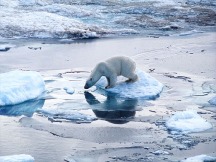So, what is climate change?
Not just a load of hot air

In Britain, we adore the weather. From the most upmarket London restaurants to the rugged pubs of the Welsh mountains, you'll always find someone earnestly discussing the day's outlook, and heartiliy enjoying himself. But how much do we really know? How far do we understand the unique climate of the British Isles, and its future prospects? Do we know the truth?
Planet Earth is heated by rays from the sun, which are crucial for life. Indeed, without them, plants would be unable to photosynthesise, the process by which they produce energy, and the Earth's ultimate energy source would be absent. These rays are at the heart of the aptly-named 'greenhouse effect'...
The Greenhouse Effect
Of those that reach the planet's surface, the majority of the sun's rays are absorbed and re-emitted as infrared radiation. A number of elements in the atmosphere - the so-called 'greenhouse gases' - then absorb these, and start to vibrate violently, spewing out heat in all directions. Carbon dioxide is the most widely-known of these gases, although methane, nitrous oxide and, indeed, water vapour all play a part. Heat is trapped in the atmosphere, and the average near surface temperature is therefore kept at about 15*C.
But, um, isn't that a good thing?
The greenhouse effect is a natural process. Without it, life almost certainly wouldn't be here. But mankind is altering the composition of the atmosphere, releasing vast amounts of greenhouse gases, and preventing more heat from escaping. What we've made is a kind of exagerated greenhouse effect, trapping more heat and causing temperatures worldwide to increase.
Hotter temperatures? That doesn't sound too bad

It may sound great, but, trust me, it isn't. An increase of less than 2*C would push up to 30% of all Earth's species to the brink of extinction. Severe flooding would become much more commonplace. The oceans would acidify. Malaria and other diseases would spread throughout the world. Wars would be fought over access to water. Deserts would grow at a disasterous rate. Certain societies would collapse, while glaciers would retreat further. Heat waves would strike much more often and catastrophic hurricanes would ravage cities and towns across the globe. And we don't even know what more might happen.
So what will happen to Britain?
There is a fair deal of uncertainty regarding the consequences for Britain. Flooding is almost assured. But what of temperature? What will happen to our seasons?
One scenario is that we will get colder, as the gulf stream slows. Another is that they'll be an increase in humidity and storms, dryer summers and wetter winters. Unfortunately, there is no clear consensus, which is just another reason why we need to act now.
Just what is the Kyoto Protocol? Sounds ominous.

The Kyoto Protocol is an international agreement to combat climate change. Under the treaty, Britain has until around 2010 to reduce its greenhouse gas emissions by 12.5%. Besides this, the government aims to cut CO2 emissions by 20%, and 60% by 2050.
The Protocol is the first step towards global agreement on the issue. Yet while the politicians debate, take the matter into your own hands. After having a look at the WWF 'Get on Board' note below, go to the 'What can we do?' page to find out more..
Title.
Paragraph.
The Greatest Bill to Come Before Westminster?
The UK government aims to make 60% cuts by 2050. But the scientists who first proposed that number now believe that's not enough. They now say that reductions of at least 80% are crucial, and, what's more, achievable.
Follow the link opposite to join WWF's work to make a difference. Be creative! Email your MP, join the petition, or find your own way to make a difference. The Climate Change Bill must not be neglected.

